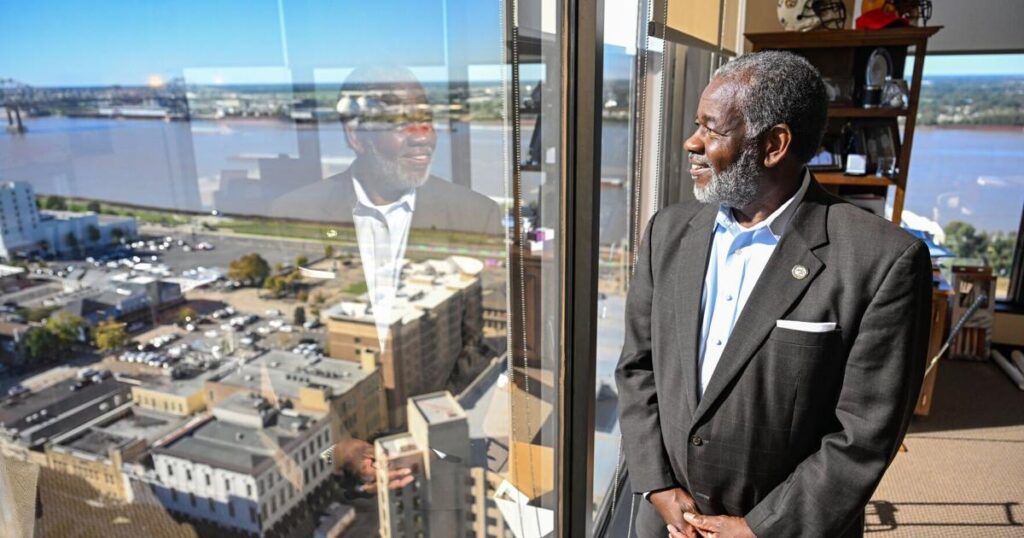When Greg Bowser first started working for the Louisiana Chemical Society and the Louisiana Chemical Industry Alliance in April 1991, he thought it would be a short-term contract.
“I was only going to be here for a little while,” he said in his high-rise office in downtown Baton Rouge, with expansive views of the Mississippi River behind him. “And 34 years later, here we are, sitting here. ” he said.
Bowser, a former defensive lineman for the LSU football team, has served as the organization’s president and CEO since 2016. After leading political affairs activities, he was promoted to the top position. The move makes Bowser the first black leader of one of the state’s major statewide business organizations.
The Louisiana Chemical Society represents the interests of 70 chemical manufacturing companies with more than 100 locations and more than 30,000 employees. The Louisiana Chemical Industry Alliance is a group of more than 800 companies that provide products, services and supplies to the state’s chemical plants.
Mr. Bowser will remain with the organization through 2025, if necessary, to ease the transition for his successor.
This week on Talking Business, Bowser reflects on his days at the Louisiana Chemical Society and discusses his predictions for the industry during President-elect Donald Trump’s second term.
The interview has been edited for length and clarity.
What accomplishment are you most proud of during your time with the association?
Bowser: Wow. I think it’s hard to narrow it down if you’ve been here for a long time. I think it’s just the fact that we’ve spent a lot of time letting people know what we do and who we are. A lot of people don’t understand what we’re making as an industry and what we’re delivering economically, but also from a product perspective. There are companies that make plastic bags that are used in medical devices and, for example, to transport blood in transfusions. We also produce synthetic fibers used in automobiles. One of our companies manufactures raw materials used in the manufacture of aspirin and various pharmaceutical products. We create products that make life convenient.
How much has the industry changed since your time with your organization?
Bowser: There’s more focus and the issue of carbon reduction is a big part of the change. Companies are becoming more environmentally conscious and sensitive, so they are spending more money to reduce their carbon footprint.
How is the transition to reducing greenhouse gas emissions progressing?
Bowser: A number of projects are starting to take off. I think as we continue to reduce greenhouse gas emissions, people will start looking for other ways to produce things using hydrogen and other things. What is important now is carbon capture and storage. I think Louisiana is at the peak of its industry, where it’s really booming. We are one of three states that have received a federal delegation to allow carbon capture and storage.
How do you think things will change for the industry in President Trump’s second term? So in some ways it looks like you’re going to stop regulating, but in other ways it looks like tariffs will be less of a benefit to the industry. I don’t think it’s great.
Bowser: That’s a mixed bag. I think imposing tariffs will cause problems. Surely you are talking about imported ones. Other countries just react to it. Often they impose duties on anything you export to them. We represent a lot of multinational companies, so things come and go all the time. So I think it may end up costing more in some cases. In some cases, you’ll probably benefit a little bit. You need to see what they are going to do.
In other words, the devil is in the details.
Bowser: Yes, that’s right. I think we need to consider that. I’m sure there will be winners and losers. One of the things we feel in this business is that a lot of our members are also competitors in the market, so what we make depends on where we are.
What is the current state of Louisiana’s chemical industry? How healthy is it?
Bowser: I think the industry is doing very well right now. I think we saw about 2.5% to 3% growth in 2023. We expect to probably have about the same growth by the end of this year. I think the industry as a whole is doing very well.
Given the economic slowdown currently occurring in China, are you concerned about how it will affect the local chemical industry?
Bowser: There are several concerns that I would like to keep an eye on. A big problem for chemical plants is the price of natural gas. As long as U.S. natural gas prices are significantly lower than China and other countries, I think our industry will do well here.



